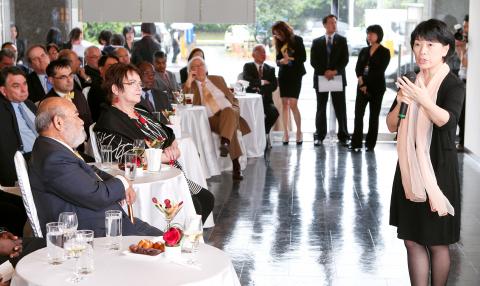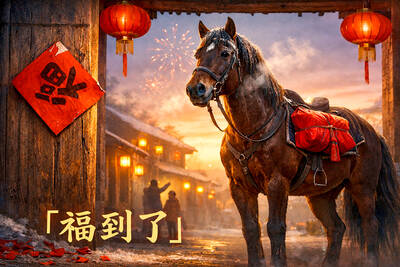Minister of Culture Lung Ying-tai invited a number of foreign dignitaries to a tea party on May 28 for the first time since taking office to share their views on matters concerning cultural exchanges. Lung said that although China’s rise has caught the world’s eye, Taiwan still plays a critical role in the area of international cultural exchanges, and she hopes Taiwan’s cultural centers overseas, which are to be called Taiwan Academies, can encapsulate all of Taiwan’s cultures, art, exhibitions and performances. She said they would be different in nature from China’s Confucius Institutes, but the exact way in which plans will be carried out is still unclear.
Talking to her heart’s content about the ministry’s ideas for cultural exchanges, Lung said that Taiwan has traditionally focused on cultural exchanges with the US and Europe, so she used her time with the dignitaries at the event to express her hopes of strengthening exchanges with Latin America, the Middle East and Africa. Representatives from Nigeria, Finland, Israel, and Canada all expressed their wishes for enhancing cultural exchanges with Taiwan based on the special characteristics of their own national cultures as well.
Regarding issues that Taiwan and China might have to deal with in their international cultural exchanges, Lung said that because Taiwan is a free society and its liberal values as a civil society are undeniable, Taiwan should make proper use of its democracy and liberal values to fulfill its crucial role in the international arena instead of belittling itself.

Photo: Wang Wen-lin, Liberty Times
照片:自由時報記者王文麟
However, when asked about specific ways in which the plans are to be carried out, Lung became more cautious and said that bilateral discussions must be held to decide whether the controversial name “Taiwan Academy” will indeed be accepted, as there are plans to increase the number of academies around the world from three to 11. She also said that Taiwan Academy is currently made up of approximately a dozen different government agencies working together, and she is currently holding discussions with the Cabinet so that it will fall under the control of one governing body.
Before the full meaning of “Taiwan Academy” can actually be realized, Lung proposed that first Taiwanese guest lecturers travel to universities around the globe to disseminate Taiwanese culture, which would include speeches given by Taiwanese artists, writers, humanities scholars, and filmmakers.
Lung also says she would like to add a Hoklo (commonly known as Taiwanese) station to the Public Television Service (PTS), saying that, “China does not really encourage the use of local dialects, and Taiwan’s works in Hoklo are excellent.” There are currently 50 million Hoklo users throughout the world, and Taiwan has the greatest advantage when it comes to Hoklo literature, music and television dramas, but she also admits that without proper funding the only thing that can currently be done is formulating strategies.
(Liberty Times, Translated by Kyle Jeffcoa)
文化部長龍應台五月二十八日首度邀請駐華使節及代表茶敘,對文化交流事務交換意見,龍應台表示,在國際文化交流場域裡,中國的崛起受到全球注目,但台灣處於關鍵的角色,她期望日後台灣在海外的文化中心,都可以涵容各類台灣文化藝術展演的「台灣書院」為名,與中國的「孔子學院」有性質上的區隔,但具體可行的作法,目前還不明確。
暢談文化部的文化交流理念,龍應台表示,過去台灣的文化交流多偏重美、歐等地,透過茶會她想向各國外交使節傳達的訊息是,希望強化與拉丁美洲、中東及非洲等地的交流。而包括奈及利亞、芬蘭、以色列、加拿大各國的使節代表,也分別就其國家文化特質表達了日後可加強交流的內容。
至於台灣與中國在國際文化交流場域上可能面對的問題,龍應台說,台灣是個開放的社會,對於一個公民社會的價值無須辯論,台灣要善用民主、開放社會的價值,扮演關鍵的角色,不要妄自菲薄。
但談及是否已有具體方案,龍應台態度卻又轉向保守,比如台灣書院要從全球三個點擴充為十一個點,能不能直接以敏感的「台灣書院」之名掛牌?都要由兩邊政府研商決定。她表示,「台灣書院」目前是十幾個部會的聯合的組織,她正在跟行政院商討轉型由一個單位統籌。
而在「台灣書院」內涵發展完善之前,龍應台則提出先在各國大學推動「台灣講座」的想法,安排台灣的藝術家、作家、人文學者或電影工作者透過講座,把台灣的文化含量散播出去。
此外,龍應台也針對在公共電視台增設閩南語電視台的理念表示肯定,「大陸是不太鼓勵方言的,」她說,「台灣的閩南語創作都很好。」全球有五千萬閩南語人口,台灣卻是在閩南語文學、音樂及電視劇創作上最具優勢的地方,但她也坦承,在沒有經費的情況下,要先擬定策略。
(自由時報記者凌美雪)

A: I’m glad that the Grammys will honor the late pop diva Whitney Houston with a Lifetime Achievement Award. Who are this year’s leading nominees? B: Kendrick Lamar is leading the nominations with nine nods, followed by Lady Gaga with seven nods. Bad Bunny, Sabrina Carpenter and Leon Thomas each gained six nods. A: I heard that the song “Golden” from global animated blockbuster KPop Demon Hunters received three nominations, including Song of the Year. B: Blackpink’s Rose and Bruno Mars’ “APT.” also received major recognition with multiple nominations, including Record of the Year, setting a milestone for

It graced statues, colored coffins, and decorated artifacts. It is Egyptian blue, the world’s oldest-known synthetic pigment born in ancient Egypt. Despite its name, it is not limited to a single hue. It ranges from deep blue to greenish tones, often glowing with an almost unearthly brilliance. __1__ In response, the ancient Egyptians developed a synthetic alternative. Not only was it visually striking, but it was also more affordable than imported indigo or natural lapis lazuli. Traces of the pigment have been discovered far beyond Egypt, from wall paintings in Pompeii to tiles in Mesopotamia. However, Egyptian blue began to fall

Bilingual Story is a fictionalized account. 雙語故事部分內容純屬虛構。 Just yesterday, the boy had helped hang the lucky red couplets. Tonight, as firecrackers signaled the New Year, he lay in bed burning with a surging fever. The herbalist checked the boy’s pulse and went still. “The only cure is in the county town across the mountains,” he said. “But the snow is deep, and the shops are shuttered until the Fourth Day.” The boy’s father looked at the window. “I will go.” “The roads are impassable for a cart,” the herbalist warned. “And too far for a man on foot.” The concerned neighbor

Contrary to popular belief, glass bottles may pose a greater microplastic risk than plastic ones. A recent study found that beverages stored in glass bottles can contain up to 50 times more microplastic particles than those in plastic containers. Researchers traced most of the contamination to the paint on the outside of the metal caps. The particles found in the drinks matched the cap’s coating in both color and composition. Experts suggest the issue may result from microscopic scratches that form as caps rub against each other during transport or storage. Such scratches can damage the painted coating, leading